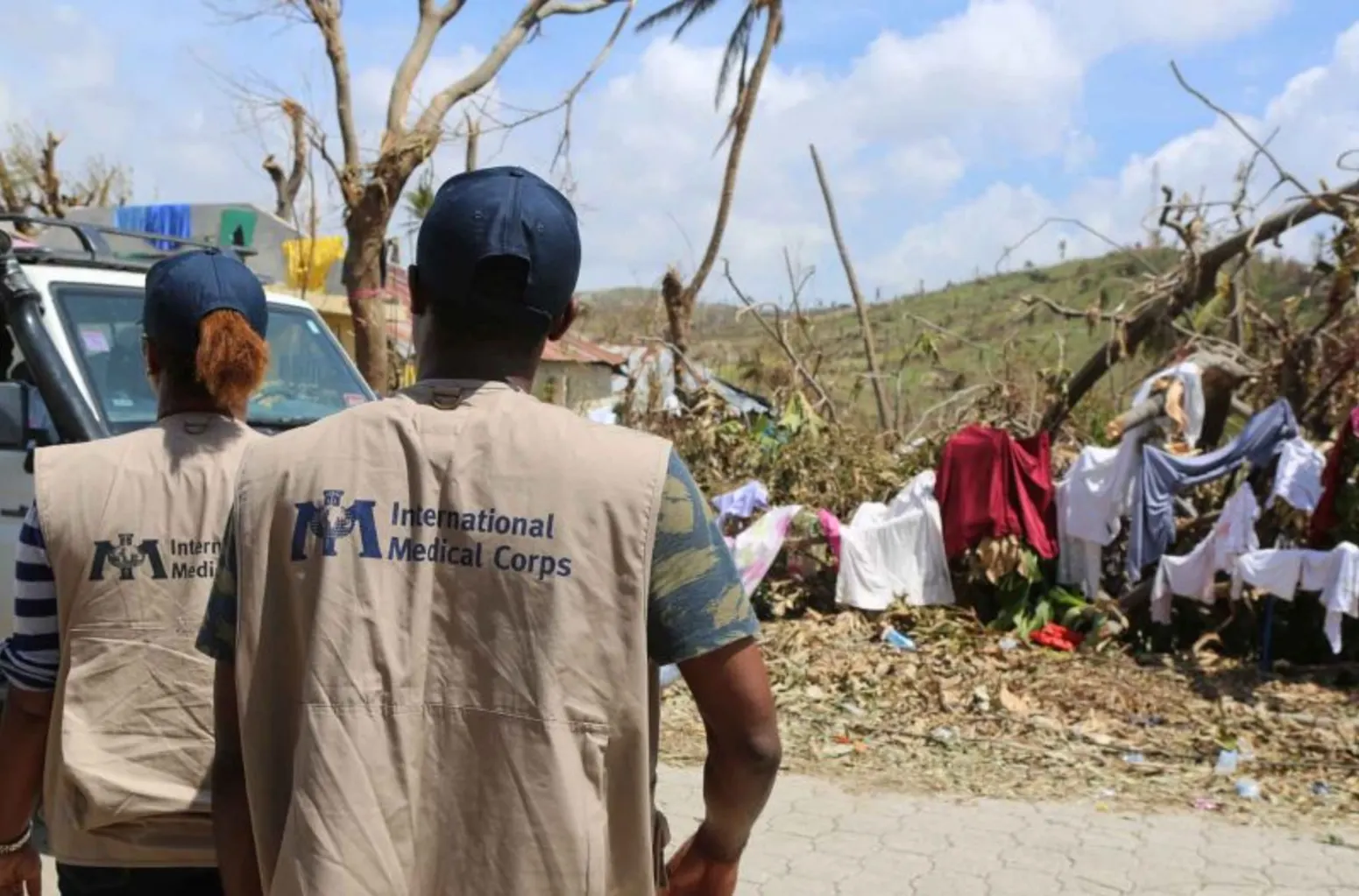
We’re excited to feature the incredibly impactful work of our nonprofit partner, International Medical Corps! International Medical Corps provides health services and training to the most vulnerable communities in the United States and around the world. Their rapid response to COVID has been nothing short of remarkable, including distributing more than 28 million infection prevention and control items and pieces of personal protective equipment. Discover more about their mission, stories of impact, and total impact to date in this piece.
Spiral: What need are you addressing, and how are you doing it?
International Medical Corps: We provide health services and training to the most vulnerable communities in the United States and around the world, including disaster-affected communities; refugees, internally displaced persons and the local communities in which they reside; individuals in remote and often inaccessible areas; those often overlooked when providing healthcare, including women, children, people living with disabilities and elder persons; those affected by conflict; and survivors of gender-based violence.
To support these communities, International Medical Corps provides the key services that a healthy community requires, including primary health, mental health and psychosocial support, reproductive health, nutrition, and water, sanitation and hygiene services. In the aftermath of sudden-onset disasters, we respond within hours—because speed saves lives—and go anywhere, no matter the conditions.
Beyond the immediate response, International Medical Corps also helps communities move from relief to self-reliance by passing essential skills into local hands and thereby preparing those in disaster-prone areas to better withstand adversity. Embedding these skills into the community lies at the heart of what we do. It gives people struck by tragedy a sense of ownership over their recovery and the ability to shape their future as they rebuild.
Spiral: What’s a story of a life you’ve transformed through your work?
International Medical Corps: In mountainous Yemen, about 80 miles north of Aden, one of our mobile teams learned of a family tragedy. A local farmer—the family’s lone breadwinner—had suffered a stroke a few months earlier, leaving his wife and their 17-month-old son, Essa, destitute. The boy was brought to the clinic, where our team found he was severely malnourished. His worried mother recounted the boy’s weight loss and illness since her husband fell ill. She had been unable to pay for the medications her child needed to stem his decline.
Our team provided the mother with the needed medications, along with enough therapeutic nutrients to feed and strengthen her child. They also gave the mother a kit filled with crucial hygiene products, so she can prevent further infections. Our team followed up frequently to manage Essa’s health and nutrition, and his condition improved markedly. His immune system was again able to fight off illness, and he resumed life as a normal kid. His mother told us: “I finally can see my child smile again.”
Spiral: What’s the total impact your nonprofit made last year in numbers?
International Medical Corps: In 2020, we launched the largest emergency response in our history, working to prevent and control the spread of COVID-19 in each of the nearly 30 countries and territories where we currently conduct our lifesaving programming, including the United States. Before the year was over, we had supported more than 1,300 health facilities, including hospitals, clinics and nursing homes, where local resources had been overwhelmed by the sheer volume of cases.
Our COVID-19 response included distributing more than 28 million infection prevention and control items and pieces of personal protective equipment, including masks, gloves and gowns. We screened 6,758,778 patients for COVID-19 and identified 138,517 patients as suspected COVID-positive. We trained 28,249 frontline healthcare professionals on COVID-19 prevention and control measures, and, critically, we reached more than 8.2 million people with information and education on COVID-19 prevention, good hygiene and community wellness.
Alongside our COVID-19 response, we continue to respond to disasters. Overall, in 2020 International Medical Corps responded directly to the needs of more than 18.5 million people on five continents. This worked spanned the broad range of services that healthy communities require to thrive, including: 5 million medical consultations; 47,389 births aided by the presence of a trained birth attendant; 120,492 children treated for malnutrition; 2.5 million people provided with water, sanitation and hygiene services; 735,000 people provided with mental health and psychosocial support services; and protection and support to 993,067 people living with the threat—or the reality—of gender-based violence.
Importantly, as training underpins all that we do at International Medical Corps, we trained 117,452 people on a variety of health-related topics, including 13,290 people on communicable disease management, which is critical to fight the spread of COVID-19, and 1,576 community health volunteers on the basics of psychological first aid, which is critical to spotting the signs of distress caused by COVID-19 or other devastating humanitarian crises and helping people get the support they need.
Spiral: What’s an innovation in the way you serve that has enabled you to increase your impact?
International Medical Corps: A critical component of our work involves procuring and delivering medicines to people, often in difficult and ever-changing conditions. Effective pharmaceutical supply-chain management is essential to 1) ensuring efficiency in the supply chain, which, given the costs of medicines, produces sizeable savings that accrue directly to beneficiaries; 2) reducing stock-outs through a more effective warehouse management process; 3) reducing paperwork so pharmacists can spend more time with patients; and 4) collecting data that can be used to improve health outcomes.
To achieve this, International Medical Corps developed a pharmaceutical information management system (PIMS) that is designed to be used in different humanitarian settings. PIMS software consists of modules that address different processes within the supply chain, from planning and procurement to distribution to beneficiaries.
Importantly, PIMS helps to solve one of the most complex challenges in delivering humanitarian assistance: monitoring pharmaceutical use and effectiveness at the “last mile” of the supply chain, where varying conditions and limited connectivity present difficult challenges. It provides:
- complete visibility of the movement of pharmaceuticals from the central warehouse to all points of dispensing;
- readily available reports and statistical analysis for both internal decision making and external communications;
- standardization in the flow of commodities and information, while minimizing the number of steps in the supply chain process, enabling efficiency and reducing errors;
- an improved patient and healthcare worker experience; and
- software that is customizable, versatile and adaptable to diverse settings via mobile handheld devices.
Spiral: “If a donor were to support you today, what could you do with that gift?”
International Medical Corps: With your donation, we can boost vaccination rates.
Getting a person vaccinated for COVID-19 anywhere helps people everywhere. With COVID-19 cases continuing to spread across the globe, and dangerous new variants continuing to evolve, distributing billions of doses of COVID-19 vaccines as quickly and as safely as possible is critical. Because many communities around the world have health infrastructures that don’t have enough resources, it is critical to provide support for their vaccination efforts.
Our experience operating immunization programs for measles, polio, Ebola and other infectious diseases in regions underserved by medical providers and in communities with endemic poverty bolsters our ability to contribute to one of the largest vaccination missions the world has seen.
International Medical Corps also is well positioned to contribute to this effort, as we have strong relationships with ministries of health in the countries where we operate and are working with them on strategies around cold-chain management, ways to overcome “last mile” challenges in low-resource environments and how to conduct COVID-19 vaccine information campaigns that are accurate and effective.
We also work to bring vaccinations to underserved communities in the US. Having developed a national network of partners in the country through the course of our COVID-19 response, we have been able to identify and rapidly respond to domestic COVID-19 vaccination needs as well.


